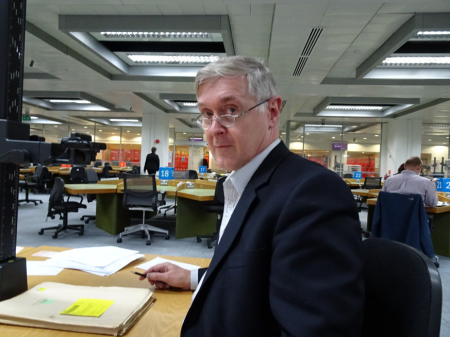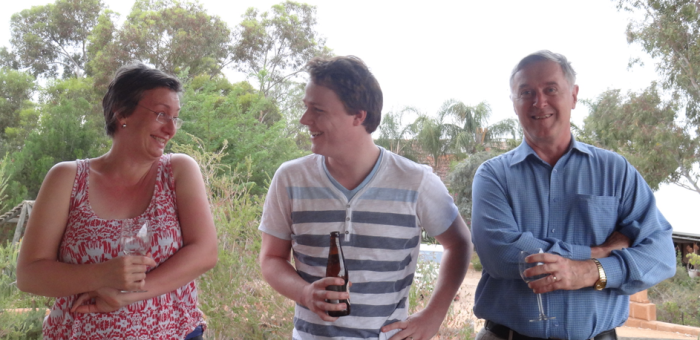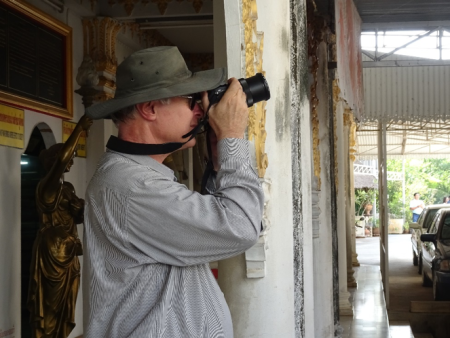Life membership: Robert Cribb
Professor Robert Cribb awarded Honorary Life Membership of the ASAA

Robert Cribb, now an Emeritus Professor of Asian History at the Australian National University (ANU), is an outstanding Asian Studies scholar and teacher. His research and writing crosses national, disciplinary, and linguistic boundaries. He is a gifted teacher and has been a generous mentor to scores of peers and younger scholars throughout his career. He has served the national and international Asian Studies community in a wide range of administrative leadership roles. They include two terms as President of Asian Studies Association of Australia (ASAA) between 2004 and 2007, and convening or co-convening of two of ASAA’s biennial conferences.
Born in Brisbane into a family of academics, Robert was the odd one out who went into Humanities instead of Botany. But family botanical expeditions gave him a knowledge of basic science and of plant and animal life that is not very common among Humanities scholars. Robert graduated from the University of Queensland with Honours in History, then from the School of Oriental and African Studies in London with a PhD in Indonesian History. He went on to become one of the world’s leading historians of Indonesia. He has taught a wide range of subjects, especially on Asian history and politics, with a focus on Southeast Asia, but also on methodological topics like how to detect lies and propaganda in public discourse.

Robert began his career as Lecturer in Contemporary Indonesian Politics and History at Griffith University in 1983. He moved to ANU in 1987, to the University of Queensland in 1990, and back to ANU in 2003. He was Head of the Department of Pacific and Asian History for three years and remained at ANU until his retirement in 2022. Along the way he was a visiting lecturer at the University of Leiden and a Fellow-in-Residence at the Netherlands Institute for Advanced Studies at Wassenaar in the Netherlands. In 1997–99, he served as Director of the Nordic Institute of Asian Studies in Copenhagen.
Robert’s intellectual interests remain grounded in Indonesian History but have expanded to encompass the whole of the Asia–Pacific region. His research is characterised by its broad scope and by his willingness to address big questions. He is best known as a scholar of violence and mass killings, work that began with his first monograph, Gangsters and revolutionaries: The Jakarta People’s Militia and the Indonesian Revolution 1945–1949 (1992). He was a pioneer in examining the Indonesian killings of 1965–66 and went on to an extensive and ongoing project on Japanese war crimes in Asia during the Second World War. Robert also does research on national identity, environmental politics, and historical geography. All his work is based on intensive archival research and formidable linguistic skills. Robert’s research languages include not only English, Indonesian, and Dutch, but also German, Swedish, French, Danish, and Latin.
A hallmark of Robert’s research and publishing has been collaboration with other scholars. He has seven major edited or co-edited volumes so far. In a tribute to his high standing in the field, Robert was invited to take on the editorship of one of the volumes, covering 1800 to the present, of the prestigious Second Cambridge History of Southeast Asia. The three-volume set is optimistically scheduled to be published in 2026. Five of his nine monographs (the ninth to appear soon) have been co-written. On Japanese war crimes he has collaborated at various stages with Sandra Wilson, Beatrice Trefalt, and Dean Aszkielowicz. Robert and two colleagues from different disciplines, Helen Gilbert and Helen Tiffin, also produced an innovative collaborative work on the cultural history of the orangutan, Wild Man from Borneo (2014). Robert’s considerable expertise in maps and mapping is exhibited in his Historical Atlas of Indonesia (2000) and in the Historical Atlas of Northeast Asia, 1590–2010 (2014), the latter co-authored with Li Narangoa.

Robert’s research has been supported by eight ARC Discovery Grants, one ARC Large Grant, and a Linkage Grant. One of his co-authored books, Japanese War Criminals: the Politics of Justice After the Second World War (2017, with Wilson, Trefalt and Aszkielowicz), was awarded the NSW Premier’s Prize in History, and Wild Man from Borneo was a finalist for the same award. He has been a Fellow of the Australian Academy of the Humanities since 2006 and served as Head of its Asian Studies Section between 2010 and 2012, and again from 2019 to 2021.
Robert’s service to the Asian Studies community has been unstinting. He has generously supported many people’s careers, either as a formal supervisor or through informal assistance. He frequently gives advice on manuscripts in progress. A large number of colleagues and students are familiar with the very high standards he requires, encourages, and fosters in scholarly work; the number of ‘track changes’ in work he reviews is legendary. Robert has been a member of a variety of international and national advisory boards and committees. In recent years one of his notable contributions to the field has been the series of free, intensive courses he has run for Australian-based scholars who want to acquire a reading knowledge of Dutch for scholarly purposes.

In sum, Robert’s career is marked by outstanding scholarship, commitment to teaching, and a very high level of professional generosity.
Sandra Wilson, Professor of History, College of Law, Arts and Social Sciences, Murdoch University
Images: courtesy of Sandra Wilson
